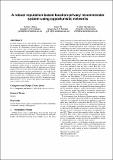Files in this item
A robust reputation-based location-privacy recommender system using opportunistic networks
Item metadata
| dc.contributor.author | Zhao, Yuchen | |
| dc.contributor.author | Ye, Juan | |
| dc.contributor.author | Henderson, Tristan | |
| dc.date.accessioned | 2016-10-26T14:30:15Z | |
| dc.date.available | 2016-10-26T14:30:15Z | |
| dc.date.issued | 2016-12-01 | |
| dc.identifier | 245970023 | |
| dc.identifier | 2c1d6bcf-2a6e-41f5-b6da-b7b4f3af41ee | |
| dc.identifier | 85041291091 | |
| dc.identifier.citation | Zhao , Y , Ye , J & Henderson , T 2016 , A robust reputation-based location-privacy recommender system using opportunistic networks . in Proceedings of The 8th EAI International Conference on Mobile Computing, Applications and Services . ACM , 8th EAI International Conference on Mobile Computing, Applications and Services , Cambridge , United Kingdom , 30/11/16 . https://doi.org/10.4108/eai.30-11-2016.2267031 | en |
| dc.identifier.citation | conference | en |
| dc.identifier.other | Bibtex: urn:f11eacd7e054cf8fc0de23895049c6d1 | |
| dc.identifier.other | ORCID: /0000-0002-2838-6836/work/68280956 | |
| dc.identifier.uri | https://hdl.handle.net/10023/9707 | |
| dc.description.abstract | Location-sharing services have grown in use commensurately with the increasing popularity of smart phones. As location data can be sensitive, it is important to preserve people’s privacy while using such services, and so location-privacy recommender systems have been proposed to help people configure their privacy settings.These recommenders collect and store people’s data in a centralised system, but these themselves can introduce new privacy threats and concerns.In this paper, we propose a decentralised location-privacy recommender system based on opportunistic networks. We evaluate our system using real-world location-privacy traces, and introduce a reputation scheme based on encounter frequencies to mitigate the potential effects of shilling attacks by malicious users. Experimental results show that, after receiving adequate data, our decentralised recommender system’s performance is close to the performance of traditional centralised recommender systems (3% difference in accuracy and 1% difference in leaks). Meanwhile, our reputation scheme significantly mitigates the effect of malicious users’input (from 55% to 8% success) and makes it increasingly expensive to conduct such attacks. | |
| dc.format.extent | 285084 | |
| dc.language.iso | eng | |
| dc.publisher | ACM | |
| dc.relation.ispartof | Proceedings of The 8th EAI International Conference on Mobile Computing, Applications and Services | en |
| dc.subject | Location-based services | en |
| dc.subject | Privacy | en |
| dc.subject | Recommender systems | en |
| dc.subject | Opportunistic networks | en |
| dc.subject | Security | en |
| dc.subject | Shilling attack | en |
| dc.subject | QA75 Electronic computers. Computer science | en |
| dc.subject | NDAS | en |
| dc.subject.lcc | QA75 | en |
| dc.title | A robust reputation-based location-privacy recommender system using opportunistic networks | en |
| dc.type | Conference item | en |
| dc.contributor.institution | University of St Andrews. School of Computer Science | en |
| dc.identifier.doi | 10.4108/eai.30-11-2016.2267031 | |
| dc.identifier.url | http://mobicase.org/2016/ | en |
This item appears in the following Collection(s)
Items in the St Andrews Research Repository are protected by copyright, with all rights reserved, unless otherwise indicated.

